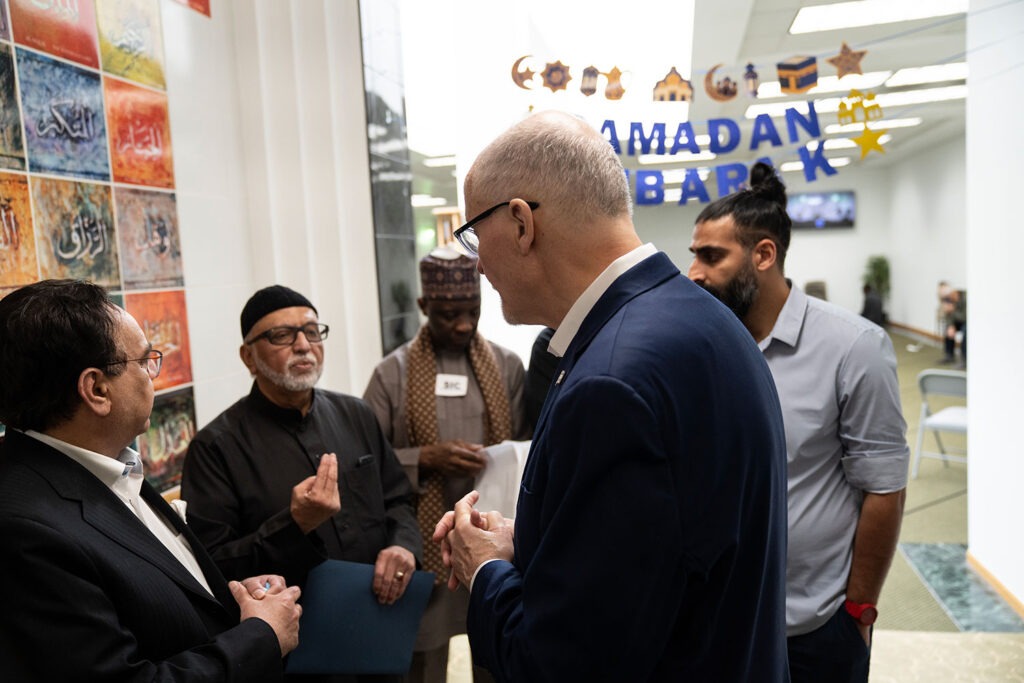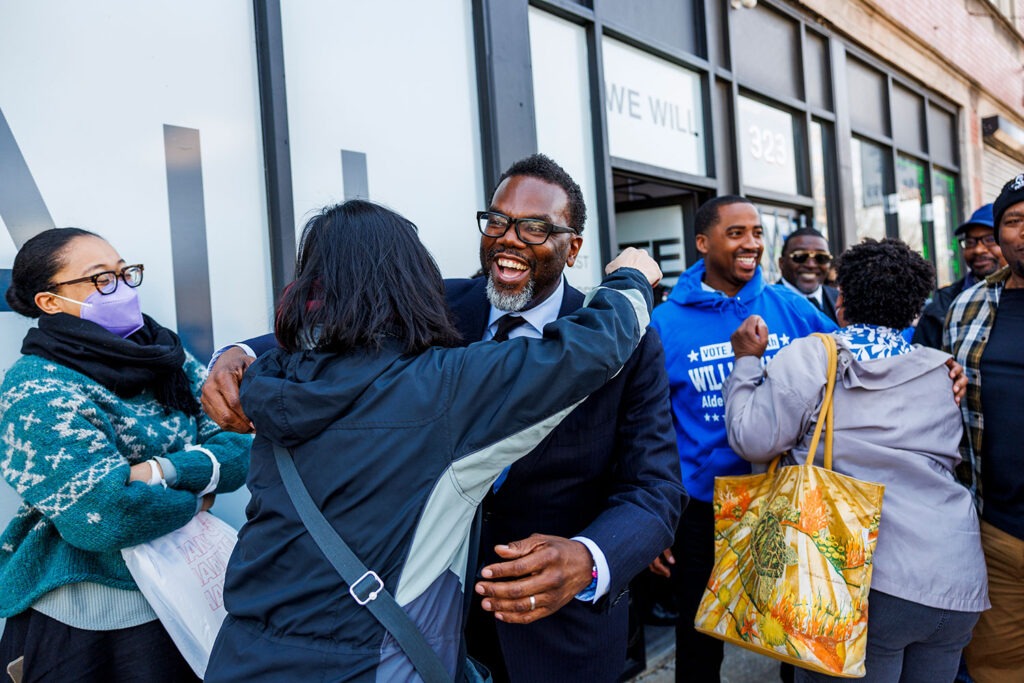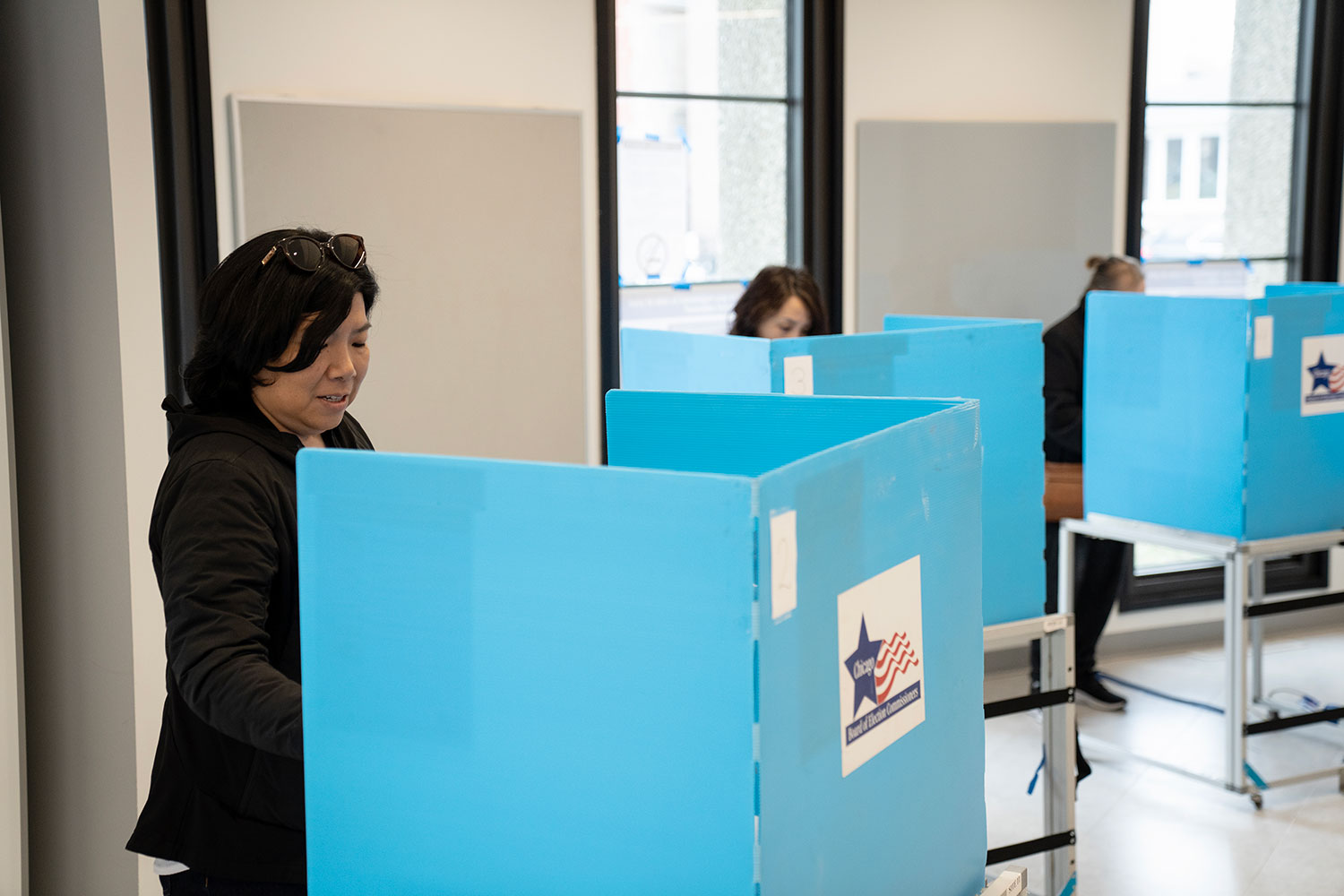Paul Vallas had to take off his shoes to campaign last Friday. Vallas stopped in at the Downtown Islamic Center, 231 S. State St., for noontime Ramadan prayers. Hundreds of worshippers sat cross-legged on the floor, listening to a sermon by Imam Syed Khan. They knelt in submission, showing their backs to the ceiling, chanting “Allahu Akbar!” Vallas sat on a folding chair, in a blue suit and a pair of athletic socks, making notes on an iPad.
“We have a very special guest here today, and I would like everyone to give him a few minutes, inshallah,” Khan said at the end of the service.
Vallas rose. He was the tallest man in the room, as he is in many rooms.
“Salaam,” he greeted the crowd. “I want to wish all my Muslim friends Ramadan mubarak.”
Vallas told his new Muslim friends that, as CEO of the Chicago Public Schools, he made sure Muslim students and staff had prayer times, and meals that suited their religious beliefs. When his father-in-law, Dean Koldenhoven, was mayor of Palos Heights, he defended the right of Muslims to open a mosque…and was defeated at the next election. For that, Koldenhoven received the John F. Kennedy Profile in Courage Award in 2002.

In Chicago politics’ game of building ethnic coalitions, the conventional wisdom says that there are three groups — Blacks, whites, and Latinos — and that whoever wins two of them will control the city. In this, the closest mayoral election in decades, Vallas and Brandon Johnson have been campaigning hard among Muslims and Asians, two groups that don’t fit into the traditional equation. Both Vallas and Johnson visited the Inner City Muslim Action Network in Chicago Lawn to break a Ramadan fast.
“I know that both candidates have stepped up their game with the Muslim community,” said Salman Azam, an executive board member of the center, who estimates that there are 500,000 Muslims in the Chicago area. “They’re seeing that this is a community that has become part of the fabric of the city. Vallas did not come earlier in February, but now they’re in a dead heat.”
Asian-Americans make up only 6 percent of the electorate, but in a race that pollsters say could be decided by two points, their votes could be decisive, said Grace Pai, executive director of Asian American Midwest Progressives, which has endorsed Johnson.
“In a tight election like this, every vote matters,” Pai said. “Historically, Asian-Americans have not been a priority for candidates running for office, but we have been the margin of victory in recent high-profile campaigns,” such as the 2021 Georgia Senate runoffs, won by Democrats Jon Ossoff and Raphael Warnock.
And so, on Saturday afternoon, Brandon Johnson was digging into a samosa at Sukhadia’s Sweets and Snacks, an Indian bakery at 2559 W. Devon Ave. Consuming ethnic food is a ritual of retail politics. Johnson, a man who can fill a size XL t-shirt, ate with gusto. He was joined by Rep. Jan Schakowsky, who represents Devon Avenue, and Rep. Ayanna Pressley, who represents Boston, but grew up in Chicago.
“A lot of time, the Devon area is pushed back,” said Sneh Sukhadia, the owner’s son. “People don’t come to check us out, but we’ve got a lot of voting power. His campaign reached out to the store. You don’t see a lot of people coming out here to meet the Indian community. I’m a progressive, in terms of politics. I definitely want to see a new face in Chicago.”

Mayor Richard J. Daley once said that as soon as an ethnic group is large enough to control a ward, politicians have to pay attention to it. Chinese-Americans now control Daley’s own 11th Ward. Last year, Ald. Nicole Lee, the first Chinese-American on the city council, was appointed by Mayor Lori Lightfoot to replace Daley’s grandson, felonious Ald. Patrick Daley Thompson. Lee’s appointment was supported by the Daley family, and the Daleys are supporting her in the runoff against police officer Anthony Ciaravino. Lee signs fill the windows of Daley Insurance on Halsted Street, owned by county commissioner and 11th Ward committeeman John P. Daley.
A Victory Research poll found that Johnson is winning Asian voters, 56 percent to 37 percent. But Vallas received 58 percent of the vote in the 11th Ward. Asian-Americans, who make up a majority of residents in Armour Square and a plurality in Bridgeport, have absorbed the neighborhood’s traditional conservatism. So at the same time Johnson was in Little India, Vallas was at the Ivy Garden Learning Center in Chinatown, campaigning with Alderwoman Lee and joining a performance of the Chinese Lion Dancers.
“This election is maybe the most important election in a generation, and it’s going to be decided by who comes out to vote,” Vallas told the crowd. “I am a candidate who has balanced billion-dollar budgets and I’m running against a candidate who can’t even pay his water bill and hasn’t run anything.”
Johnson’s next Saturday afternoon stop was Nha Trang restaurant on Argyle Street, the main drag of Chicago’s Vietnamese community, where the owners put out a buffet of egg rolls, chicken wings, and orange slices. The candidate was introduced by Rep. Hoan Huynh, who represents Uptown as one of eight Asian-Americans in the Illinois legislature.
“We’re the fastest-growing demographic in Chicago,” Huynh said. “People are recognizing that we’re a community that needs to be talked to. We understand the issues that Brandon Johnson is for. He’s a person of color. He understands communities of color. These are refugees, they’re immigrants.”
At Nha Trang, Johnson was also joined by Leni Manaa-Hoppenworth, a Filipina-American running for 48th Ward alderperson against developer Joe Dunne.
“I’m going to be brief because I’m a little distracted by the menu,” said Johnson, who does not seem to mind eating his way through a campaign schedule. “This movement is based on policy, but what is most remarkable about this movement is that we have love enough for everyone. No one should be too poor to live in one of the richest cities at one of the richest times in history. We’re going to build affordable housing, create pathways to home ownership, eliminate the structural deficit and make $1 billion in investments without raising property taxes.”
Johnson’s final stop was an Asian American Midwest Progressives rally at Hearthstone and Terrace, a furniture store on Wilson Avenue. The group printed “Brandon is Better” signs in Hindi, Urdu, Korean, Chinese, Vietnamese, Japanese, Khmer and Tagalog. State Sen. Ram Villivalam praised Johnson as “someone committed to making sure there is not just one Asian-American in a room where decisions are being made.”
State Rep. Theresa Mah then told a story on Vallas. In 2014, Mah and County Commissioner Josina Morita, who both have Chinese-American ancestry, worked on Pat Quinn’s campaign for governor. Vallas was Quinn’s running mate. “Every single weekend, at a campaign event or a parade, he would confuse us.”
The crowd groaned.
“So we have somebody who cannot tell the interns apart,” Mah said. “He cannot see us and cannot represent us.”
Finally, Morita announced, “We’re going to do the Asian thing real quick: take photos. Then we’re going to do the other Asian thing: go vote.”
Johnson posed for one last photo, with one last Asian delicacy: a carp burger. He took one bite. A candidate can only eat so much, no matter how good the food is.



